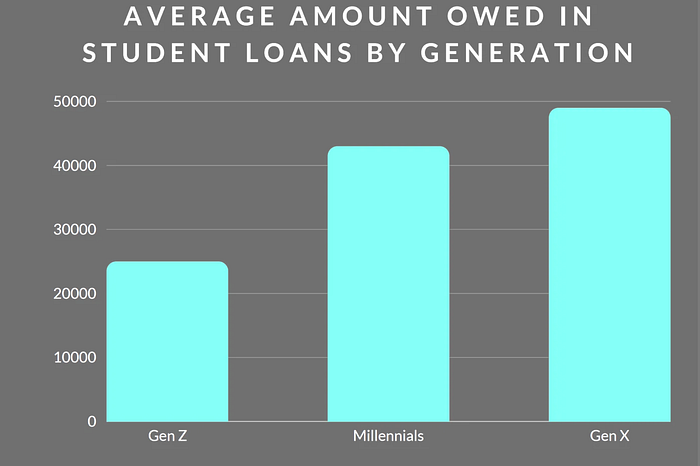Over a third of Gen Z has entered the workforce, and they're a force to be reckoned with. They're going to be shaping the corporate landscape, but they're disillusioned with the corporate dystopia left as a legacy by their parents.
And we slag them off for it.
You might have heard that Boomer cliche being tossed around, 'Gen Z is lazy, entitled and simply don't want to work hard'.
But can we blame them, with the system they've inherited? How many of us experienced the work-life balance that humans need to be successful (at more than just work)?
Our current workplace wasteland includes an unsustainable rising cost of living, stagnant wages, a housing affordability crisis, and a mental health crisis.
A Myopic Financial Dystopia
Corporate America isn't the most fun place, but we do it to pay the bills. But it's not paying the bills anymore in these new economically upside-down times. The cute but archaic financial ideal of getting a degree, then a good job (that sets you up for life with a company that takes care of you), buying a home, and having a family — doesn't work like it used to.
And Gen Z isn't willing to repeat the mistakes of their parents.
Student Loans
A trend started in the 1980s and continued for almost forty years — more and more jobs required a degree. Between 2010 and 2016 75% of jobs required at least a bachelor's degree, which had grown 12% since 1980.
By 2021 however, that dropped to just 44% — too late for the first wave of Gen Z graduates though, who now feel tricked into their expensive but useless degrees. And they're paying for it.

Gen X and millennials still account for the majority of student debt, due to how unserviceable the payments can be. You can pay off tens of thousands of dollars before ever paying down the principal. All for jobs that may not truly need a degree, at low wages that take a lifetime of work to pay their loans off.
Gen Z have become disillusioned with higher education but it's a narrative that many still try to push on them.
Smart companies however are pivoting and not requiring a four-year degree, opting for experience- and skill-based hiring instead — and this trend needs to build.
Many of the new technology and marketing jobs don't require a degree, they leverage skills Gen Z has learned as the first digital natives (the first to grow up online). Like social media marketing — an industry they have built-in knowledge of, and can navigate in ways that many of us never will.
Unrealistic Home Ownership
Boomers (ages 57–75) touted home ownership as the key to financial success, but were also lucky enough to do so at the beginning of the housing bubble. They bought homes at affordable prices, which grew significantly in value and became part of their retirement portfolio.
As much as my generation, millennials (ages 27–42) like to complain we were priced out of the market — low-interest rate mortgages still made it a possibility.
"Between 2019 and 2022, home ownership among US Millennials increased almost 10 percentage points. In 2016, about 34 percent of Millennial-headed households owned a home; by 2022, 53 percent did," says Financial Review
Gen Z however, are facing high interest rates and high values. Currently, only 41% of Gen Z hope to be able to afford a home one day. And without drastic changes, that hope may be stomped out.
"To afford the median-priced home of $433,100, Americans need an annual income of roughly $166,600. However, the median household earns just $74,580, and entry-level positions pay around half of that," says Forbes.
It's hard to be motivated to work hard when at the end of your long day you go home to your parent's house.
In true Gen Z resilient spirit though, they've moved their goalpost. Instead of buying a home — they're investing. Currently, 54% of Gen Z hold some type of investment, in either stocks, EFTs, or NFTs. Half of them still don't feel confident due to knowledge gaps — but they're learning.
Reshaping Corporate America
Gen Z will be 27% of the workforce by 2025 and they're bringing an inherent set of skills that many of us could only dream of. With a fairly bleak financial forecast, they'll be reshaping corporate America into something that works for them.
They want the work-life balance that so many of us struggled with our entire work lives. Like the one that made my own parents miss a good chunk of my childhood, time that they can never get back. Almost 80% of them state that work-life balance is a top priority — and they're beginning to demand it.
It's a globally connected world now, and they see that Americans are working harder than their European counterparts with nothing to show for it (although significantly less than many Asian countries).
"The average 40-hour-per-week employee in the U.S. is working 400 more hours annually — the equivalent of 10 more weeks — than employees in Germany," reports Money.com.
The previous trend of companies becoming 'leaner' by dissolving a role and load-shedding the responsibilities onto others, unpaid — they aren't having it. They're saying no.
They're quiet quitting.
Quiet quitting has been around for a while, but it's a growing trend and currently affects six out of ten employees. A trend that is costing the world almost $9 trillion annually. It's when someone psychologically disengages from their work, doing the job description and nothing more.
Instead, they're looking for careers that will fulfill them, and that will make them feel challenged and supported. From companies with the values they hold dear — work-life balance, authenticity, transparency, fun, and social responsibility.
In response to this, some companies uno-reversed them with quiet firing, where they make the workplace conditions so horrible that they quit. The smart ones however are working to become the places Gen Z wants to be at. A place that recognizes their skills, offers lattice-based growth opportunities offers remote flexibility, and flex time off.
No wonder a small subset of them are looking to things like the TradWife movement, traditional stay-at-home wives and mothers — but to the unrealistic extreme. We need more flexibility in the workforce for young parents.
They're clocking out instead of leaning in, and I can't blame them.
Bleak to Bright
I clocked out of the traditional job market decades ago, I too was disillusioned — and I watched many of my friends have their souls sucked out their fingers in corporate America. Work-life balance has run amok. The legacy we left them was pretty shit, it didn't work out so great for many of us.
Without the promise of a home and stable economic future — they have better ways to spend their lives. Why are we so mad that they don't want to work themselves to death — because we're upset that we've done it? That's a weird thing to wish on others.
We need to stop raining on their digitally-enhanced parade just because they're doing what we wish we had. And seeing as the average person spends one-third of their life (90,000 hours) working — why shouldn't we want better?
The way they're shaping and modeling the market into the future they want— that's inspiring. And I'm excited to see the world they recreate for themselves. It's their world, it's time we took a step back and let them create the world they want to live in.
And I sincerely hope they do a better job than we did.


